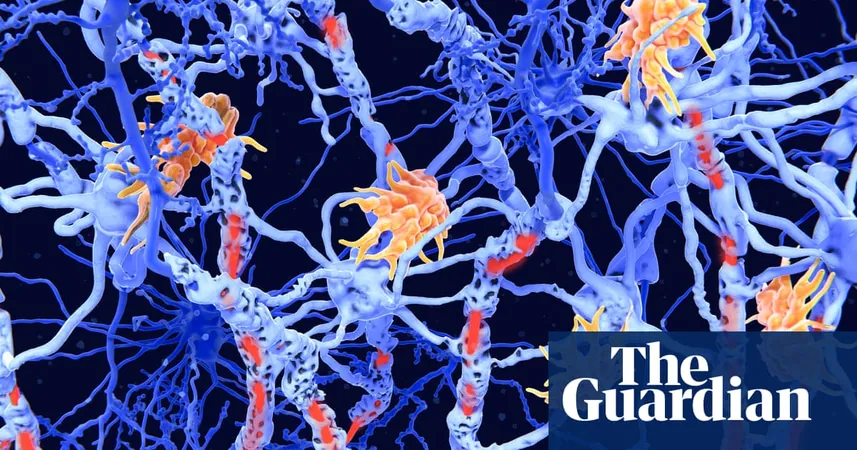
Revolutionary ‘Inverse Vaccines’: The Breakthrough Solution for Autoimmune Diseases?
2025-05-12
Author: Olivia
What Are Inverse Vaccines?
Autoimmune diseases impact around 800 million individuals globally, which is roughly one in ten people. Conditions like multiple sclerosis, lupus, type 1 diabetes, and rheumatoid arthritis share a troubling characteristic: the body’s own immune system mistakenly attacks its healthy tissues.
Current Treatments Fall Short
Existing therapies typically seek to suppress the immune system as a whole, which can leave patients susceptible to other infections. Many require daily, invasive treatments to manage symptoms.
A New Hope Emerges
A ground-breaking approach is on the horizon with the development of 'inverse vaccines'—a term for treatments that inhibit only the rogue elements of the immune response. Stephen Miller, an immunologist at Northwestern University, aptly describes it as the 'holy grail,' aiming to use precision (a scalpel) rather than blunt force (a sledgehammer) to tackle these disorders.
Pioneering Research on Celiac Disease
In 2021, Miller and his team published a pioneering study in *Gastroenterology,* marking the first evidence of inverse vaccines working effectively in humans. They focused on celiac disease, where the immune system attacks the intestinal lining in response to gluten.
In a two-week trial with 33 patients, those who received the inverse vaccine experienced no intestinal damage, while the placebo group showed worsening symptoms. This promising finding suggests a more targeted, effective approach to treatment.
How Do Inverse Vaccines Work?
The ingenious design of inverse vaccines utilizes synthetic nanoparticles linked to specific disease-related proteins called antigens. These nanoparticles mimic dying human cells, which the immune system typically recognizes as non-threatening. In essence, the treatment re-educates the immune system to disregard these proteins, preventing self-attack.
Successful Trials with Multiple Sclerosis
In 2023, NYU bioengineer Jeffrey Hubbell and colleagues showcased that this method could impede the mouse model of multiple sclerosis, where the immune system targets nerve cells. Their company, Anokion, has announced successful human trials for both celiac disease and MS.
Broad Applications and More Research
Immunologist Pere Santamaria noted that this strategy is versatile and seems broadly applicable across various autoimmune diseases. Santamaria, who has shifted some focus from type 1 diabetes to explore these inverse vaccines for conditions like primary biliary cholangitis, shared that the rarity of some diseases can expedite approvals.
Potential Beyond Autoimmunity
Excitingly, research suggests that inverse vaccines might also open doors for treating allergies. Recent studies showed that mice with peanut allergies and those sensitive to dust mites experienced fewer symptoms after receiving the vaccine. The potential to change the way the immune system perceives these allergies could revolutionize treatment.
Looking to the Future
While it's currently unclear when inverse vaccines will be approved for human use, optimism abounds in the research community. Collaborations between biotech startups and major pharmaceutical companies are thriving, with several inverse vaccines progressing into phase two trials.
Experts anticipate that we could see these innovative treatments available in three to five years, although some caution that it might take up to ten years or more to refine the process.
The Outlook is Bright
Despite the uncertainties, there's a palpable sense of hope within the scientific community. The prospect of effectively treating autoimmune diseases with such accuracy is a leap forward that some hypothesized might be impossible just two decades ago. Today, specialists like Miller confidently assert that this solution is not just a dream—it's on its way to becoming a reality.









 Brasil (PT)
Brasil (PT)
 Canada (EN)
Canada (EN)
 Chile (ES)
Chile (ES)
 Česko (CS)
Česko (CS)
 대한민국 (KO)
대한민국 (KO)
 España (ES)
España (ES)
 France (FR)
France (FR)
 Hong Kong (EN)
Hong Kong (EN)
 Italia (IT)
Italia (IT)
 日本 (JA)
日本 (JA)
 Magyarország (HU)
Magyarország (HU)
 Norge (NO)
Norge (NO)
 Polska (PL)
Polska (PL)
 Schweiz (DE)
Schweiz (DE)
 Singapore (EN)
Singapore (EN)
 Sverige (SV)
Sverige (SV)
 Suomi (FI)
Suomi (FI)
 Türkiye (TR)
Türkiye (TR)
 الإمارات العربية المتحدة (AR)
الإمارات العربية المتحدة (AR)